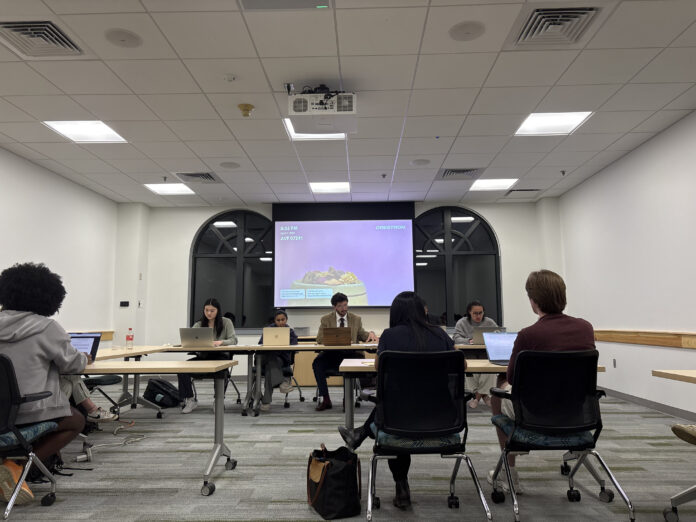Thursday, April 3rd, the College of William and Mary’s Student Assembly Review Board dismissed the formal complaint against the campaign of class of 2026 President Zoe Wang ’25 MPP ’26 and Sen. Matt Swenson ’26 filed by Secretary of Diversity and Inclusion William Henderson ’26 and Deputy Secretary of Outreach Alena Jones ’25 M.Ed ’26.
The Review Board ruled unanimously that the appeal does not provide substantial evidence to remove Wang and Swenson from the ballot and overturn the results.
In the election held Thursday, March 27, Wang and Swenson emerged victorious by a margin of 43 votes over Henderson and Jones.
Henderson and Jones submitted their appeal based on new evidence that allegedly depicted Wang and Swenson engaging in early campaigning. Saturday, March 29, this appeal was submitted to both the Independent Election Commission and the Review Board, 38 hours after the election results were announced.
“We submit this appeal requesting the removal of Zoe Wang and Matt Swenson and their ticket from the ballot due to repeated and documented violations of the Student Assembly Code of Ethics, specifically related to premature campaigning and public solicitation of platform input,” Henderson and Jones wrote.
Tuesday, April 1, Wang and Swenson submitted a formal response to the complaint for consideration before the Review Board’s decision.
“The alleged violation is insignificant and did not influence the outcome of the election,” Wang and Swenson wrote. “No action was taken as a result of the textual evidence.”
In the decision penned by Zane Peters J.D. ’26, the five-person judicial branch held that three text messages asking a non-campaign worker for ideas on Wang and Swenson’s campaign platform, weeks before the official campaigning period, did not affect the election outcome.
The Review Board ruled that any Title 6 claims must first be filed with the Independent Election Commission no more than 24 hours after the election before it can be appealed to the Review Board. The decision claims that Henderson and Jones missed this deadline by 14 hours.
“Without a previous trial, there can be no appeal,” Peters wrote. “Any contestation of an election certification, without a case originally brought before the Independent Election Commission would be just that: a contestation.”
Two review board members dissented against the ruling that appeals must be filed with the IEC beforehand but upheld that the evidence submitted did not merit the invalidation of the March 27 election.
“I agree that the evidence presented was insufficient to show that any alleged irregularity could have materially changed the outcome,” Muhammed Al Saffar ’27 and Adrianna Kopp ’25 wrote. “However, I cannot agree with the majority’s conclusion that the Petitioners lacked the right to bring the appeal in the first place. The Review Board’s constitutional function includes serving as a final safeguard for electoral fairness — not merely an appellate body for IEC decisions.”
The SA Code prohibits “asking an organized group or non-campaign workers to review a candidate’s platform or submit ideas to be included in a platform.” The board acknowledged that the messages did breach the SA Code, but denied that they had an impact on the election.
“Petitioners’ only allegation of Respondents’ early campaigning are three messages before, and one after, the campaign period asking for an individual’s advice on campaign perspective,” Peters wrote. “While this is undoubtedly a breach of 6 S.A.C. ch. 2 § 5(III)(E), the individual in question never responded to any of the messages. As such, we cannot find the message attempts could have in any conceivable way influenced the outcome of the election.”
The Review Board emphasized that the Henderson and Jones campaign also violated the SA Code, deciding against the application of a double standard.
“Respondents alleged, and provided evidence, that Petitioners created a campaign Instagram account which included the Petitioners’ names,” Peters wrote. “As this is also a violation of 6 S.A.C. ch. 2 § 5(III)(C), anything other than keeping both candidates on — or taking both candidates off — the ballot would be unfair treatment.”
In a statement to The Flat Hat, Henderson shared his response to the outcome of the appeal.
“I fully respect the Review Board’s decision, and I’m grateful that William & Mary has leaders like Zoe and Matt who are deeply passionate about fighting for what they believe is best for the student body,” Henderson wrote. “I’m more than happy to support a smooth transition for them as they prepare to lead next year.”
Henderson described the importance of the appeal in clarifying ambiguous parts of the SA Code.
“Our appeal pushed the Review Board to take a closer look at the rules and codes, highlighting areas that were ambiguous and needed clarification,” Henderson said. “While changes have been made, some parts of the code still remain unclear. I think it’s important to recognize that our challenge prompted a deeper evaluation, and that’s something to be proud of.”
Henderson also shared that the complaint was not personal.
“I believe the complaint we submitted had valid grounds, and I’m proud that we stayed committed through to the end,” Henderson wrote. “It was never personal — it was purely from the perspective of the campaign. Zoe and Matt are truly wonderful people, and it’s been a pleasure working with them in the past. They are the embodiment of what it means to be supportive, caring members of this community.”
Wang and Swenson described their reactions following the review board’s decision.
“While we were disheartened to hear that the integrity of our campaign had been brought into question, we do firmly believe that the appeals process is integral and necessary for ensuring a free and fair election,” Wang and Swenson wrote. “We affirm that we ran a clean campaign, a fact supported by the Review Board.”
This article has been updated for corrections at 4:33 pm on Friday, April 4.

